Lectures & Seminars
Annual Lecture Series
The Wall Center sponsors two annual lectures, The Evans Family Lecture in Pulmonary Medicine and The Dunlevie Family Lecture in Cardiopulmonary Medicine. These lectures feature internationally renowned speakers who are leading clinicians and researchers in the field of pulmonary vascular disease.
The Evans Family Lecture Series in Pulmonary Medicine takes place in the Fall and is featured during the Department of Medicine Grand Rounds. The Dunlevie Family Lecture Series in Cardiopulmonary Medicine is held each Spring and is presented as part of Department of Pediatric Grand Rounds.
There are no lectures at this time. Check back for updates!
|
Past Lectures
- 10th Dunlevie Family Lecture - April 11, 2014
Dr. Dunbar Ivy Bio Sketch - 12th Evans Family Lecture –September 25, 2013
Dr. Evangelos Michelakis Bio Sketch | Photo - 9th Dunlevie Family Lecture - May 3, 2013
Dr. Mark Krasnow Bio Sketch - 11th Annual Evans Family Lecture – January 25, 2011
Dr. Anton Vonk Noordegraaf Bio Sketch - 10th Annual Evans Family Lecture – May 13, 2010
Dr. Andrew J. Peacock Bio Sketch - 9th Annual Evans Family Lecture – May 27, 2009
Dr. Stuart Rich Bio Sketch - 8th Annual Dunlevie Family Lecture – October 31, 2008
Dr. Aldo R. Castaneda Bio Sketch - 8th Annual Evans Family Lecture – February 15, 2008
Dr. Paul M. Hassoun Bio Sketch - 7th Annual Dunlevie Family Lecture – May 18, 2007
Dr. Stephen L. Archer Bio Sketch - 6th Annual Evans Family Lecture – September 14, 2006
Dr. James E. Loyd Bio Sketch - 6th Annual Dunlevie Family Lecture – May 19, 2006
Dr. Robyn J. Barst Bio Sketch - 5th Annual Evans Family Lecture – February 23, 2006
Dr. Kurt R. Stenmark Bio Sketch - 5th Annual Dunlevie Family Lecture – May 13, 2005
Lecture Summary [PDF]
Dr. Sheila G. Haworth Bio Sketch - 4th Annual Evans Family Lecture – November 4, 2004
Lecture Summary [PDF]
Dr. Duncan J. Stewart Bio Sketch - 4th Annual Dunlevie Family Lecture – May 14, 2004
Lecture Summary [PDF]
Dr. Steven H. Abman Bio Sketch - 3rd Annual Evans Family Lecture – November 6, 2003
Lecture Summary [PDF]
Dr. Coughlin BioSketch - 3rd Annual Dunlevie Family Lecture – May 9, 2003
Lecture Summary [PDF]
Dr. Trembath Bio Sketch - 2nd Annual Evans Family Lecture – November 7, 2002
Lecture Summary [PDF]
Dr. Stamler Bio Sketch - 2nd Annual Dunlevie Family Lecture – May 10, 2002
Lecture Summary [PDF]
Dr. Rabinovitch Bio Sketch - Inaugural Evans Family Lecture – November 15, 2001
Dr. Rubin Bio Sketch - Inaugural Dunlevie Family Lecture – May 17, 2001
Dr. Landzberg Bio Sketch
10th Dunlevie Family Lecture – April 11, 2014
"A New Era in Medical Management of Severe Pediatric Pulmonary Hypertension"
Dunbar Ivy, MD
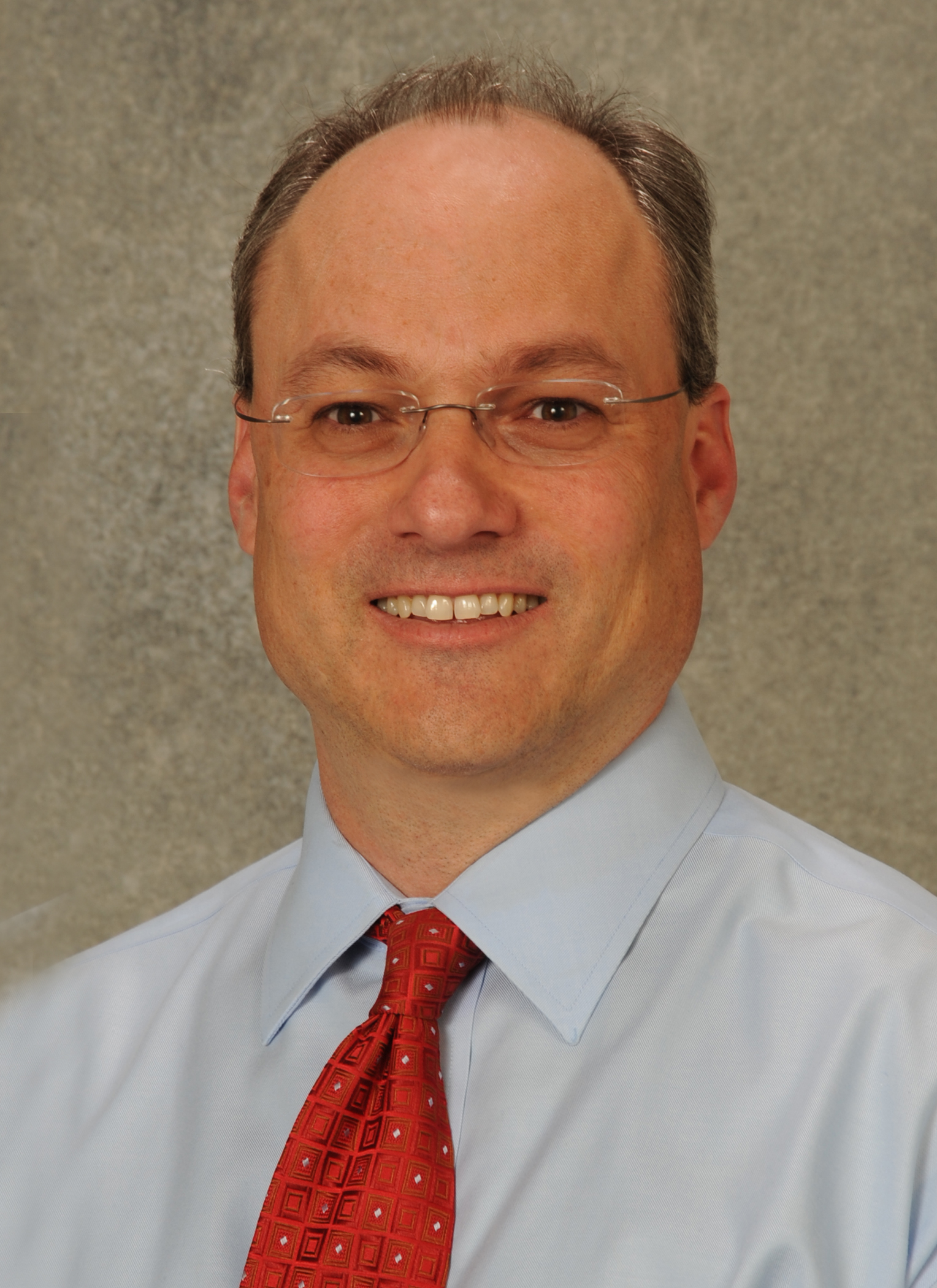
Dunbar Ivy, MD graduated from Tulane University School of Medicine in 1988. He completed his pediatric residency and fellowship in pediatric cardiology at the University of Colorado, Denver. In 1996 Dr. Ivy joined the faculty at Children’s Hospital Colorado and was appointed as an Assistant Professor of Pediatrics at the University of Colorado School of Medicine. He became the Director of the Pulmonary Hypertension Program in 2001. In 2003 Dr. Ivy became Section Head of Pediatric Cardiology and was named to Selby’s Endowed Chair of Pediatric Cardiology. He was promoted to the rank of Professor of Pediatrics with tenure in 2007.
Active in multiple professional societies, Dr. Ivy is a member of the Pulmonary Hypertension Association Board of Trustees. He currently sits on the Editorial Boards for Advances in Pulmonary Hypertension and Congenital Heart Disease: Clinical Studies from Fetus to Adulthood. Dr. Ivy’s active NIH projects include: The Functional and Biological Phenotyping of Pediatric Pulmonary Hypertension (RO1) and National Biological Sample and Data Repository for PAH (R24). His areas of interest include the treatment of pulmonary hypertension in children and the proteomics of pulmonary vascular disease.
12th Evans Family Lecture – September 25, 2013
"Pulmonary Arterial Hypertension is a systemic metabolic disease: A potential paradigm shift, its translational implications and challenges for the future"
Evangelos Michelakis, MD
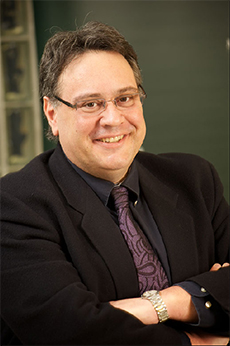
Evangelos Michelakis was born in Greece where he attended medical school at the University of Patras. He completed training in vascular biology, internal medicine and cardiology at the University of Texas (Galveston), Yale University and University of Minnesota. In 1998 he joined the faculty of the University of Alberta and is currently a professor and vice chair (research) in the Department of Medicine. Dr. Michelakis founded and directs the pulmonary hypertension (PH) program and maintains an active laboratory focusing on the discovery of novel therapies for PH. His group was the first to report the results of two small trials documenting the benefits of Viagra in pulmonary hypertension. This eventually led to world-wide approval for its use in PH. He is the chair-elect of the 3-CPR Council of the American Heart Association and is the Canada Research Chair in Applied Molecular and Mitochondrial Medicine. Recently, Dr. Michelakis has discovered intriguing similarities in the mitochondrial biology of PH and cancer which are leading him into new areas of translational and cancer research.
9th Dunlevie Family Lecture –May 3, 2013
"A New Genetic Model Organism for Medicine"
Mark Krasnow, M.D., PhD

Mark A. Krasnow is a Professor of Biochemistry at Stanford University School of Medicine. He earned his B.S. in Biology and Chemistry from the University of Illinois in 1983 and his M.D. and Ph.D. in biochemistry from The University of Chicago in 1985 under the guidance of Nicholas R. Cozzarelli. He did his postdoctoral work on the Ultrabithorax gene with David Hogness at Stanford University. He has been a professor at Stanford since 1988 and is currently the chair of the program. His research is focused on understanding the molecular, genetic, and cellular mechanisms of tracheal development using drosophila and mice. He has been a Howard Hughes Medical Institute (HHMI) investigator since 1997 and is a Fellow of the American Association for the Advancement of Science and the American Academy of Arts and Sciences. SInce 2011 Dr Krasnow has served as the executive director of the Vera Moulton Wall Center for Pullmonary Vascular Disease at Stanford.
Read more about Dr. Krasnow's research at his HHMI profile
11th Annual Evans Family Lecture – January 25, 2011
"The Paradox of the Right Ventricle"
Anton Vonk Noordegraaf, M.D., PhD
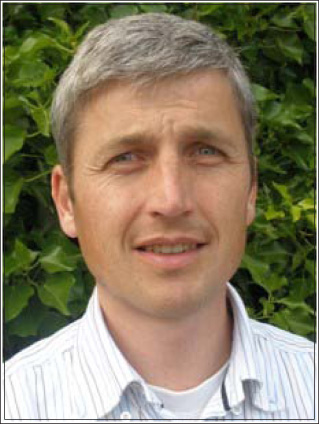
Anton Vonk Noordegraaf, MD, PhD is a Professor of Pulmonary Medicine at the Vrije Universiteit Medical Center Amsterdam, a tertiary referral center for pulmonary arterial hypertension(PAH) in the Netherlands. Dr. Vonk Noordegraaf obtained his medical degree with honors from the Vrije Universiteit Medical Center, Amsterdam, in 1995. He was awarded a PhD in 1997 for his thesis entitled: Imaging of the Heart and Right Ventricle by Means of Electrical Impedance Tomography and Magnetic Resonance Imaging. He then spent a year as a research fellow at Pennsylvania University, Philadelphia where he was dedicated to the research of pulmonary circulation in ARDS. After completing a fellowship in pulmonary medicine at Vrije Universiteit in Amsterdam, Dr. Vonk Noordegraaf joined the Division of Pulmonary Sciences at the University in 2003, where he remains to the present day. He has published numerous international peer reviewed papers and is the recipient of multiple awards including the European Respiratory Society Pulmonary Arterial Hypertension Research Award and the Dutch Academy of Sciences (KNAW): Descartes Huygens Award in 2009.
10th Annual Evans Family Lecture – May 13, 2010
"Pulmonary Vascular Cell Proliferation: The Role of p38 Map Kinase"
Andrew J. Peacock, BSc, MPhil, M.D., FRCP

Professor Andrew Peacock is the Founder and Director of the Scottish Pulmonary Vascular Unit at Western Infirmary and Golden Jubilee National Hospital in Glasgow, Scotland. His research focuses on pulmonary vascular physiology and biology both in animal models and man. As a visiting scientist at the National Heart and Lung Institute in London he studied the mechanisms of pulmonary vascular hypertrophy. His clinical research includes the evaluation of non-invasive methods for measuring pulmonary haemodynamics and the initiation of 24-hour invasive measurement of pulmonary artery pressure in patients with secondary pulmonary hypertension. Dr. Peacock is the Vice Chairman (Chairman-elect) of PH Physicians of UK and Ireland and founder of the Pulmonary Vascular Group of the British Thoracic Society. The author of numerous publications, he is co-editor with Joan Barbera of the recently released book Therapeutic Strategies in Pulmonary Arterial Hypertension as well as the soon to be released Pulmonary Circulation: Diseases and their Treatments (3rd Edition) with co-editors Robert Naeije and Lewis Rubin.
9th Annual Evans Family Lecture – May 27, 2009
"Academic Challenges Facing the Treatment of Pulmonary Hypertension in a Changing World"
Stuart Rich, M.D.
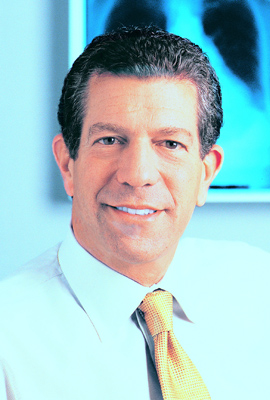
Dr. Stuart Rich is one of the country’s foremost experts on pulmonary heart disease and the spectrum of pulmonary hypertension (PH). His pioneering research has led to a greater understanding of all types of PH. Over the years, he also has led the development of many new PH treatments, including the use of intravenous prostacyclin. Presently, Dr. Rich is a Clinical Professor of Medicine at the University of Chicago Medical Center.
He has published hundreds of clinical articles and book chapters on pulmonary heart disease. In addition, he is currently the President and Chairman of the Pulmonary Vascular Research Institute (PVRI) an international academic medical center. The activities of the PVRI incorporate the traditional triad of research, education, and clinical care with the education and clinical care targeted towards countries with healthcare disparities.
8th Annual Dunlevie Family Lecture – October 31, 2008
"Evolution of Pediatric Cardiac Surgery"
Aldo M Castaneda, M.D., PhD
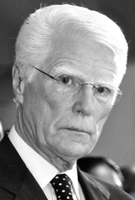
Aldo R. Castañeda is a pioneer in pediatric cardiac surgery. Based on his early research, Dr. Castañeda focused his program toward the early correction of complex cardiac malformations in infants and newborns. These efforts culminated in the successful repair of transposition (with or without ventricular septal defect) in neonates, giving rise to the modern era of neonatal cardiac surgery.
Dr. Castañeda received his training at the University of Guatemala and the University of Minnesota. Upon completion, he remained at Minnesota as a faculty member. In 1972 he accepted an appointment as Cardiac Surgeon-in-Chief at The Children’s Hospital in Boston and Professor of Surgery at Harvard Medical School. From 1981 to 1994 he served as Surgeon-in-Chief at The Children’s Hospital. Dr. Castañeda’s contributions to pediatric cardiac surgery are remarkable and well documented in his more than 400 scientific articles and two books.
Dr. Castañeda’s work has spanned the globe. Upon retirement he returned to Guatemala and developed the first and only program for pediatric cardiac surgery in Central America. More than forty of Dr. Castañeda’s trainees have served as chiefs of Pediatric Cardiac Units at institutions across the globe. In 2006 he was appointed to the Pediatric Cardiology Hall of Fame.
8th Annual Evans Family Lecture – February 15, 2008
"Scleroderma-related Pulmonary Arterial Hypertension: Challenges and Hope"
Paul M. Hassoun, M. D.

Paul M. Hassoun, MD is currently a Professor of Medicine at Johns Hopkins University School of Medicine and Director of the Pulmonary Hypertension Center at Johns Hopkins Hospital. Dr. Hassoun earned his medical degree from the Faculte de Medecine Lariboisiere-Saint-Louis, University of Paris, France in 1981. He then completed his internship and residency at Brigham and Women’s Hospital/Harvard Medical School followed by fellowship training in pulmonary and critical care medicine at Massachusetts General Hospital/Harvard Medical School. From 1988–2002 Dr. Hassoun served as a faculty member at Tufts University School of Medicine. Co-author of more than fifty peer-reviewed publications, Dr. Hassoun currently holds NIH grants studying the role of xanthine oxidase in lung injury and molecular approaches to ventilator-associated lung injury. He is also the Program Director/Principal Investigator for a Specialized Center of Clinically Oriented Research in Pulmonary Vascular Disease (SCCOR) award entitled “Molecular determinants of pulmonary arterial hypertension.”
7th Annual Dunlevie Family Lecture – May 18, 2007
"Pulmonary Hypertension 2007: An Update on Diagnostic Criteria, Mechanisms, and Experimental Treatments for the Clinician"
Stephen L. Archer, M.D.

Stephen L. Archer, MD is Chief of Cardiology and the Harold H. Hines Jr. Professor of Cardiology at the University of Chicago. Prior to his move to Chicago in 2007, Dr. Archer was Professor of Medicine and Physiology and Director of the Cardiology Division at the University of Alberta where he was the founder of the Vascular Biology Research Group. In 2004 he received a Canada Research Chair in Oxygen Sensing and Translational Cardiovascular Research. Dr. Archer’s research has helped define the molecular basis for hypoxic pulmonary vasoconstriction and has discovered therapies for pulmonary hypertension and persistent ductus arteriosus. His awards include the 2004 Research Achievement Award from the Canadian Cardiovascular Society, the 2003 Capital Health Researcher of the Year Award and the 2002 Paul Armstrong Research Achievement Award. An author of four books, Dr. Archer has also published over 130 peer-reviewed papers. Dr. Archer takes special pride in the 20 young investigators he has mentored over the past decade.
6th Annual Evans Family Lecture – September 14, 2006
"Basic Mechanisms in Familial PAH"
James E. Loyd, M.D.
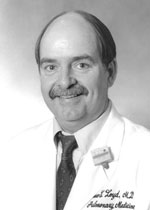
Dr. Jim Loyd received his undergraduate and medical degrees from West Virginia University. He completed residency and fellowship training in Internal Medicine and Pulmonary and Critical Care Medicine at Vanderbilt University School of Medicine. Following an extended fellowship in England as the AHA British American Research Fellow at Oxford University he joined the Vanderbilt faculty in 1983. Currently, Dr. Loyd is the Rudy W. Jacobson Professor in Pulmonary and Critical Care Medicine at Vanderbilt. He is the Director of a national Familial Primary Pulmonary Hypertension Registry which has been fundamental to understanding the genetic basis of Familial Pulmonary Arterial Hypertension and its link to BMPR2 and other genes of interest. He is currently the principal investigator for an NIH award which aims to understand the genetic and environmental pathogenesis of PAH.
Dr. Loyd is a member of the PHA Scientific Leadership Council and has lectured worldwide and published extensively on genetic links to, and predispositions for, the development of Idiopathic and Familial PAH.
6th Annual Dunlevie Family Lecture – May 19, 2006
"Pulmonary Arterial Hypertension in Children: Evaluation, Diagnosis and Treatment"
Robyn J. Barst, M.D.

Robyn J. Barst, M.D. is a Professor of Pediatrics at Columbia University College of Physicians & Surgeons and at Cornell University School of Medicine. She is also the Director of the Pulmonary Hypertension Center at New York Presbyterian Hospital. In 1976 she began her residency in pediatrics at Columbia and completed fellowships in pediatric cardiology and pediatric pulmonary medicine. In 1983 she was appointed Assistant Professor of Pediatrics at Columbia and named the Parker B. Francis Fellow in Pulmonary Research.
Dr. Barst is the recipient of numerous awards including the National Heart, Lung and Blood Institute Clinical Investigator Award and the American Heart Association Clinical Scientist Award. She currently serves as Chair of the Scientific Leadership Committee for the Pulmonary Hypertension Association and on the editorial boards of the journals Circulation and Chest.
5th Annual Evans Family Lecture – February 23, 2006
"Recent Insights into Pulmonary Vascular Remodeling: Opportunities for New Therapies"
Kurt R. Stenmark, M.D.

A native of Colorado, Dr. Stenmark attended the University of Colorado and he completed fellowships in Pediatric Critical Care at the Children’s Hospital, Denver and in Cardiovascular Pulmonary Research at the University of Colorado Health Sciences Center (UCHSC). Currently, he is a Professor and Chief of Pediatric Critical Care and Director of the Developmental Lung Biology Laboratory. As the principal investigator of a Specialized Center of Research (SCOR) Grant from the NIH, he leads a group investigating the basic cellular and molecular mechanisms involved in pulmonary vascular remodeling and the response of the lung vasculature to hypoxia and other injuries. Dr. Stenmark is the recipient of many awards and honors including: Best Doctors in America and the American Thoracic Society’s Distinguished Scientific Accomplishments Award.
5th Annual Dunlevie Family Lecture – May 13, 2005
"The Clinical Application of Basic Research in Patients with Pulmonary Hypertension"
Sheila G. Hawarth, M.D., F.R.C.P

Dr. Sheila G. Haworth is the British Heart Foundation Professor of Developmental Cardiology, Head of Cardiorespiratory Sciences, and Head of the Unit of Vascular Biology and Pharmacology at the Institute for Child Health, University College London. Early in her career, she held a fellowship in fetal and perinatal physiology at Columbia University. Dr. Haworth then completed her training in pediatric cardiology at London’s Brompton Hospital where she also became a staff member. Since that time, she has become a leading researcher and clinician responsible for standardizing the care of children with PH across the United Kingdom. In addition, she is a prolific contributor to major journals and symposia in the field of pulmonary vascular disease.
4th Annual Evans Family Lecture – November 4, 2004
"Progenitor Cell Therapy for Idiopathic Pulmonary Arterial Hypertension: The PHACET Trial"
Duncan J. Stewart, M.D.

A graduate of McGill University, Duncan J. Stewart, M.D., returned to his alma mater as an Assistant Professor of Medicine and as a staff cardiologist at the Royal Victoria Hospital in 1987. There, he established a Vascular Biology Laboratory with a major interest in endothelial factors, in particular the role of nitric oxide and endothelin in the pathogenesis of vascular disease. In 1994, he assumed the position of Chief of Cardiology at St. Michael’s Hospital. In 1997, he became the Director of Cardiology of the University of Toronto and was awarded the Dexter Man Chair in Cardiology. He was promoted to Full Professor of Medicine at the University of Toronto in 1998 and in 2003 he became the Associate Director of Basic Science Research at St. Michael’s Hospital and Director of Regenerative Medicine at the McLaughlin Centre for Molecular Medicine at the University of Toronto.
Dr. Stewart is past Chair of the MRC Cardiovascular “A” Review Committee. He has published 117 peer-reviewed manuscripts and is on the Editorial Board of multiple scientific journals including Circulation Research. He has had a leadership role in the organization of international meetings including the 6th International Meeting on Endothelin (ET-6) held in Montreal in 1999 and the 1st Canadian Pulmonary Hypertension Symposium in Toronto in 2000. He is also past Chair of the Scientific Program Committee for the Canadian Cardiology Congress and the Research Policy Committee for the Heart & Stroke Foundation of Ontario.
4th Annual Dunlevie Family Lecture – May 14, 2004
"The Role of Nitric Oxide in Neonatal Lung Disease"
Steven H. Abman, M.D.

Dr. Steven Abman is currently a Professor in the Section of Pediatric Pulmonary Medicine and Director of the Pediatric Heart-Lung Center in the Department of Pediatrics at the University of Colorado School of Medicine, and the Children’s Hospital in Denver, Colorado. He is an internationally recognized expert in Nitric Oxide Therapy, Pulmonary Hypertension, and Perinatal Vascular Disease. Dr. Abman has received numerous awards including, most recently, the James B. Strain Award which recognizes a physician best exemplifying the values of the American Academy of Pediatrics, The Barry Smith Memorial Lecture, Department of Pediatrics, Hospital for Sick Children, University of Toronto in Canada, and the Seizo Iwai Lecture, 10th Annual Meeting of the Japanese Society of Pediatric Anesthesiology, Tsu City, Mie, Japan.
He is a member of several professional societies including the American Heart Association, the American Pediatric Society, and the Society for Critical Care Medicine. Dr. Abman has written a number of review articles in medical journals, and is currently a member of the E. Mead Johnson Award Selection Committee, Society for Pediatric Research, and the NICHD/FDA Newborn Drug Development Initiative in Baltimore, MD.
Dr. Abman received his undergraduate degree from Carleton College in Northfield, Minnesota, where he graduated cum laude. Additionally, he was the recipient of a National Science Foundation, student research grant, in the Department of Biochemistry. He went on to earn his medical degree from Northwestern University Medical School, in Chicago, and did both his internship and residency in the Department of Pediatrics at the University of Colorado Health Sciences Center (UCHSC). He did a four-year fellowship in Pediatric Pulmonary and Critical Care Medicine, in the Department of Pediatrics at UCHSC.
Dr. Abman currently lives in Denver, Colorado with his wife, Carolyn, and their four children.
3rd Annual Evans Family Lecture – November 6, 2003
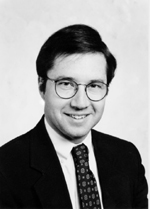
"Protease-activated Receptors in Vascular Biology"
Shaun R. Coughlin, M.D., PhD.
A graduate of Massachusetts Institute of Technology and Harvard Medical School, Shaun Coughlin, M.D., Ph.D. joined the medical faculty at the University of California, San Francisco, in 1986. He has been a Professor of Medicine since 1996. In 1997 he became Professor of Molecular and Cellular Pharmacology and Director of the Cardiovascular Research Institute.
Dr. Coughlin has received numerous awards in recognition of his work including, most recently, the Russell Ross Memorial Lecture in Vascular Biology (American Heart Association, 2003), the Pasarow Foundation Award for Cardiovascular Research (2003), the Stuart R. Stone Memorial Lecture (FASEB, 2003), and the Basic Science Prize (American Heart Association, 2003). He has published more than 118 articles, reviews, and book chapters. Dr. Coughlin also serves on a number of scientific editorial and advisory boards.
3rd Annual Dunlevie Family Lecture – May 9, 2003
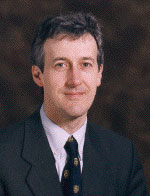
"Signaling a Rise in Pulmonary Pressure: Prospects for Screening and Early Intervention in Primary Pulmonary Hypertension"
Richard Trembath, FRCS
Dr. Richard C. Trembath is Professor of Medical Genetics at the University of Leicester in England. Prior to his appointment as professor, he was Senior Lecturer in Medical Genetics from 1992 to 1998. From 1987 to 1989 he served as Registrar in General Medicine and Endocrinology at St. Bartholomew’s Hospital in London, and was Lecturer in Medical Genetics at the Institute of Child Health in London from 1990 to 1992.
Dr. Trembath’s long-time interest in the pathogenesis of human disease was firmly established early in his undergraduate days at Guy’s Hospital Medical School. He worked with Professor Cedric Mimms and Dr. Dennis McCance (who is now at the University of Rochester), and gained exposure to molecular approaches to investigating infectious diseases. Dr. Trembath's general medical training was followed by clinical training in Diabetes and Endocrinology at St. Bartholomew’s Hospital in London with Professor Michael Besser.
Dr. Trembath’s key observation while at the institute of Child Health came with the identification of defects of the mitochondrial genome as a significant contribution to the pathogenesis of specific forms of diabetes mellitus. These studies in part explain the recognized excess of maternal transmissions in this disorder and point to a role for oxidative phosphylation in the genesis of insulin resistance.
The move to the University of Leicester provided Dr. Trembath the opportunity for detailed molecular genetic studies in a range of clinical disorders. The approach is to perform detailed and critical phenotyping together with molecular mutational analysis and, when required, a positional cloning strategy for disease gene identification.
Dr. Trembath is now using the approach to explore the pathogenesis of primary pulmonary hypertension (PPH).
Dr. Trembath’s articles have been published in a number of highly regarded academic journals. He is a member of the editorial board of the Journal of Medical Genetics, and was recently made a Fellow of the Academy of Medical Sciences.
2nd Annual Evans Family Lecture - November 7, 2002

"Translating Nitric Oxide Biology"
Jonathan S. Stamler, M.D.
Jonathan S. Stamler, M.D., is a Professor of Medicine and Biochemistry and an Associate Investigator of the Howard Hughes Medical Institute at the Duke University Medical Center in Durham, North Carolina. Dr. Stamler earned his M.D. from Mount Sinai School of Medicine in New York City. He completed his medical residency and fellowship training in both cardiology and pulmonary medicine at Harvard Medical School and Brigham and Womens Hospital. Dr. Stamler then joined the faculty of Harvard Medical School as Assistant Professor of Medicine. In December 1993, Dr. Stamler became an Associate Professor of Medicine at Duke University; he earned the title of full Professor in 1996.
Dr. Stamler has received several awards in recognition of his work. He has published more than 175 original articles, reviews, and book chapters and he has co-edited two books on nitric oxide biology. Dr. Stamler also serves on a number of scientific editorial and advisory boards. In addition, he has founded two companies, holds approximately 50 issued patents, and has many more patent applications currently under consideration.
2nd Annual Dunlevie Family Lecture - Friday, May 10, 2002
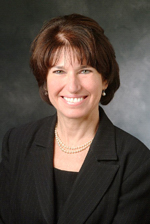
"Reversing Pulmonary Hypertension in the 21st Century"
Marlene Rabinovitch, M.D.
Dr. Marlene Rabinovitch graduated from McGill University School of Medicine in 1971 with the Cushing Award in Pediatrics. She then completed her internship and residency in Pediatrics at the University of Colorado Medical Center. After a year as Visiting Physician with the Ministry of Health and the University of the Negev in Beersheva, Israel, she began her subspecialty training in Cardiology at Texas Children’s Hospital. She completed both her clinical and research fellowship at Boston Children’s Hospital, Harvard Medical School, where she stayed on to become an Assistant Professor of Pediatrics in Cardiology. Dr. Rabinovitch then joined the Departments of Pediatric and Pathology at the University of Toronto as Associate Professor and the Division of Cardiology at the Hospital for Sick Children. In 1988, she became Professor of Pediatrics in Pathology and was also appointed Director of Cardiovascular Research.
Dr. Rabinovitch’s research on pulmonary circulation and vascular disease stems from her clinical responsibilities at the Hospital for Sick Children. Her work addresses cellular and molecular mechanisms of vascular disease, bridging the gap between pulmonary and systemic vascular pathobiology. Her contributions have also been in understanding immune inflammatory mechanisms related to the development of the post-cardiac transplant coronary arteriopathy and myocarditis. Recent studies receiving much attention in the lay press have focused on mechanistic approaches to prevent and reverse cardiovascular disease through the use of elastase inhibitors. Other proposed approaches include in utero gene therapy for congenital heart disease patients.
Dr. Rabinovitch is currently a reviewer for 21 major medical journals, on the editorial board of eight, and is currently an Associate Editor of Circulation Research and Pediatric Research. She was the recipient of the Award of Merit from the Heart and Stroke Foundation of Canada, the Research Achievement Award from the Canadian Cardiovascular Society, and was the Julius Comroe Distinguished Lecturer for the American Physiological Society. Dr. Rabinovitch was also awarded the Endowed Research Chair for the Heart and Stroke Foundation of Ontario in 1997 and the MRC Distinguished Scientist Award in 2000.
Inaugural Evans Family Lecture - November 15, 2001
Lewis J. Rubin, M.D.

Dr. Lewis Rubin is a Professor of Medicine and Director of the Division of Pulmonary and Critical Care Medicine at the University of California at San Diego. He is well known as a leader in pulmonary medicine and is widely recognized as a pioneer and expert in the field of pulmonary vascular medicine and pulmonary hypertension. He was awarded a Vascular Disease Academic Award from the National Heart, Lung and Blood Institute at the NIH and named the University of Maryland Faculty Research Lecturer of the Year in 1998.
Dr. Rubin’s laboratory research has focused on the molecular mechanisms underlying pulmonary artery smooth muscle function while his leadership is several clinical trials has lead to the development of new therapies for patients with pulmonary hypertension.
Dr. Rubin is a graduate of Yeshiva University and Albert Einstein College of Medicine in New York City. He was an intern and resident at Duke University Medical Center and was Chief of the Division of Pulmonary and Critical Care Medicine at the University of Maryland School of Medicine from 1995-1999.
Inaugural Dunlevie Family Lecture - May 17, 2001
Michael J. Landzberg, M.D.

Dr. Michael Landzberg is founding Director of BACH, or Boston Adult Congenital Heart and Pulmonary Hypertension Service of the Children’s Hospital and Brigham and Women’s Hospital, Boston, and is Assistant Professor of Medicine, Harvard Medical School. Dr. Landzberg is a native New Yorker, where he was raised in an atmosphere of family, education, confidence, interdependence, social awareness, and leadership.
Dr. Landzberg is a graduate of the Bronx High School of Science. He joined his best friend and older brother, Joel, at Columbia College, where he met his future wife, Abby. He later jockeyed between Boston and New York for Internal Medicine training and Chief Residency at Columbia Presbyterian Medical Center. This was followed by a dual Adult and Pediatric Cardiology Fellowship Training at Brigham and Women’s Hospital and Children’s Hospital, under the guidance of James Lock, in Boston. He currently remains an active teacher and clinician-scientist at both institutions.
The BACH group is a multi-disciplinary, multi-institutional team dedicated to the coordinated long-term well being of adolescents and adults born with heart disease, or living with any of a variety of pulmonary vascular disorders. Through an emphasis on patient independence, consumer as well as medical community education, a more global spirit of intra and inter-disciplinary collaboration, and openness to novel therapeutic strategies, the BACH group has been able to extend quality and quantity of life to persons and families often suffering from devastating illness.
Cardiopulmonary Research in Progress Series
The Cardiopulmonary Research-in-Progress Seminar Series was established in fall of 2002. The series aims to highlight current cardiopulmonary research and provide a venue for interaction and discussion for an audience of both clinical and basic researchers.
The talks are held on Thursdays at 4 p.m. We feature Stanford speakers, speakers from area institutions, and visiting scholars from research institutions nationwide and abroad. Visiting speakers spend the day at Stanford, meeting with colleagues with common research interests, and we host a lunch discussion with graduate students, fellows, and research associates from the group.
- Check back for 2010-2011 dates
Clinical Topics in Pulmonary Hypertension
Clinical teaching conferences are held two times per month and focus on latest topics and clinical practices related to the diagnosis and management of pulmonary vascular disease patients. The conferences feature case presentations and lectures by Wall Center faculty and staff as well as affiliated faculty from the Stanford community and guest lecturers from other medical centers. Conferences are held on the 2nd and 4th Friday of each month from 2:00-3:00 .p.m. in H3150. Please call (650) 724-9255 or e-mail wallcenter@stanford.edu

